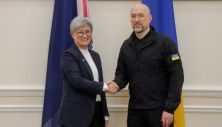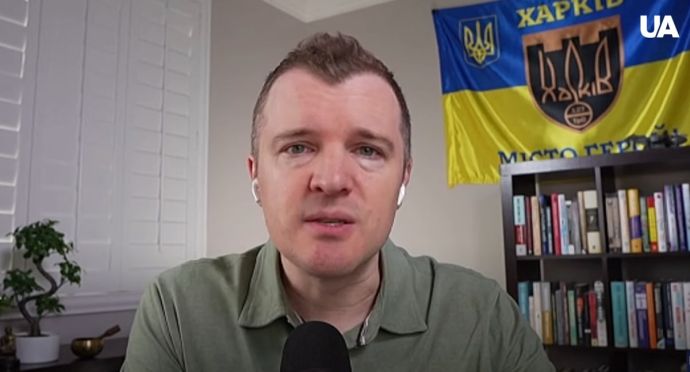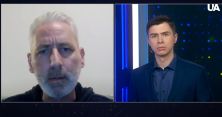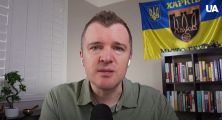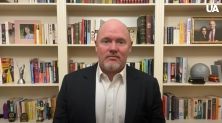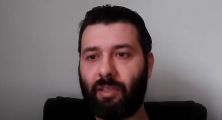Apocalypse, now or later. Trump talks badly but acts well for Ukraine. Will Trump accept a ceasefire without security guarantees? If Putin dies tomorrow – will it change Russia’s ways for the better, you think? Check it out in the new interview with @JakeBroe on UATV.
— So, Apocalypse now or a little bit later? As it seems to me, the world is still far more concerned about how much the war in Ukraine costs, rather than what it will cost if Ukraine loses. I’ve heard that the American Senate recently ordered a calculus of sorts from a “Holy Trinity” of American intelligence agencies – FBI, CIA, and NSA – to figure out what it will cost if Putin wins. I’m sure both the figures and facts will be devastating, but my question is: So what? I mean, will this calculus in any way push Donald Trump not to weaken military aid to Ukraine, for example?
— You didn’t say the word, but I think you were alluding to a potential nuclear war or World War III. And on my channel, I’ve been making the argument for the last three years that there’s no benefit for Russia to use a nuclear weapon—either tactical or larger. It doesn’t matter where Putin thinks it might benefit him; it won’t. The negatives will always outweigh the benefits, which is why Russia has not used nuclear weapons.
So you’re asking about the future costs for both NATO and specifically for Americans. At the moment, politically, we seem to be returning to our isolationist roots. America was isolationist prior to World War I and prior to World War II. I hope that history is not repeating itself and that we’re not heading for a larger conflict, because it can be avoided. If we give Ukraine the support and equipment they need to defeat the Russians today, we can prevent a broader war.
At the moment, Russia is trying to find allies willing to fight for them and with them. We’re seeing North Koreans entering the battlefield—frontline combat this week in Kharkiv. And you’re correct: think tanks and cost-benefit analyses are happening. People who understand the true costs of Ukraine falling know this: if Russia is allowed to absorb 40 million people and trillions in untapped resources, Russia will only be in a stronger position for the next war. Putin is not done. He’s not stopping after Ukraine. If Ukraine cannot hold, Russia will attack NATO countries next.
— We don’t want to go back to Soviet times—no way. But about Donald Trump—the only thing predictable about him is that he’s unpredictable. Somehow, correct me if I’m wrong, even though the things he says might sound awful to Ukrainians, the things Trump does actually turn out not too bad, or sometimes even very good for Ukraine. Would you agree with that?
— If any of my subscribers are watching, they themselves are probably shocked. On my channel, I’ve been very harsh toward Donald Trump because of the rhetoric used by people surrounding him. Comments made by RFK Jr., Vivek Ramaswamy, Elon Musk, JD Vance—I judged Trump based on the company he kept. But Trump himself was always very vague. He always said he could end the conflict in 24 hours or that this never would have happened if he were president.
With American politics—this is probably true in other countries too—there’s a difference between campaigning and governing.
When you’re campaigning, you can say whatever you want. You’re not responsible for anything. If things are bad, that actually helps you politically because you can criticize the party in power. But upon winning—and Donald Trump did decisively win on November 5th—now all the responsibility is his. He’s going to take office on January 20th.
If the situation doesn’t improve, the American people will blame him.
To his credit, Trump is taking this very seriously. He appointed Mike Waltz as his National Security Advisor and Marco Rubio as Secretary of State—a good pick. His best decision, and the one I’m incredibly grateful for, is choosing retired Lt. General Keith Kellogg as his negotiator and special envoy for Russia-Ukraine.
General Kellogg is 80, but he’s experienced—he was Mike Pence’s National Security Advisor during Trump’s first administration. He’s familiar with Russia, supports Ukraine, and visited Ukraine in 2023. He has ideas, connections, and is talking to the correct people to broker a ceasefire or favorable outcome for Ukraine.
— But what if the Russians don’t cooperate? What if they don’t feel like ending the conflict?
— We’re going to see Donald Trump’s reaction in real time. I think Putin will tell Trump no. For some reason, Putin believes the war is going well for him—he thinks he’s winning. I believe that’s delusional, given the costs of taking every tree line and wheat field. But Putin has done his own calculations and thinks continuing the war benefits him.
If Trump is serious, we can nudge him in this direction: when the Russians refuse to stop hostilities, Ukraine will need more aid, more weapons, and more support. That will be the political battle here in America in February.
— Well, you probably saw that video of dead Russians lying next to dead North Koreans. What’s happening now? If Russia invaded Ukraine without guarantees, what’s stopping them from pushing further?
— I think the average American doesn’t understand how big Ukraine is. A freeze in the conflict, a ceasefire, or a DMZ is impractical. When Americans hear “DMZ,” we think of North and South Korea, which is manageable at 250-300 kilometers.
Ukraine’s current front line is over 1,800 kilometers—not counting the Belarus border or Moldova with troops in Transnistria. A DMZ in Ukraine isn’t feasible.
I think Trump will eventually understand that. People like General Kellogg will explain the harsh realities Ukrainians face and the Biden administration faced. If you think through the war logically, you reach one conclusion: the only acceptable outcome is Russia withdrawing to its internationally recognized 1991 borders. Any other outcome means this isn’t over—it’s just delayed. Putin will dedicate his life to restarting this conflict.
— If Putin dies tomorrow, do you think Russia’s ways would change for the better?
— If Putin were to disappear, I think the oligarchs would reassess the costs and benefits. The oligarchs aren’t thinking about empire or the glory days of the Tsars. They’re thinking about dollars—their next superyacht, their kids studying at Harvard or Oxford. Their lives have become significantly harder with sanctions, frozen assets, and nobody wanting to do business with them.
If Putin were removed, the oligarchs would jump at the chance to reset, de-escalate, and recover their losses. The West has offered off-ramps—Scholz, Macron, and Biden have all given options to stabilize and normalize. The world needs Russia’s oil, gas, minerals, and agriculture. Capitalist economies just want to do business. If Putin were out of the equation, and Russia withdrew its troops to the 1991 borders, sanctions would be lifted.
— Well, maybe we should start talking to the oligarchs to do something to Putin this Christmas. That would be a nice gift to the world.
— They know they’re being monitored by the FSB. None of them are willing to have that conversation because they know they’d disappear first.
Read also: Paul Niland: How to Save Ukraine from Putin’s Occupation?
